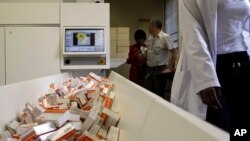YAOUNDE, CAMEROON —
The government of Cameroon says it cannot supply anti-retrovirals to half of the patients who need them because of a drastic shortage of the drugs. Health officials say the number of people receiving the anti-AIDS drug has soared from about 28,000 in 1998 to about 200,000 this year, but government assistance to treat HIV/AIDS has remained stagnant.
At a Cameroon meeting of the Association of People Living with AIDS, members say there is a critical shortage of anti-retrovirals in the country, causing the health of HIV/AIDS patients of deteriorate.
Thirty-six-year-old patient Mathieu Mvondo said the situation is becoming desperate and that getting access to treatment is very difficult. When going to the hospital, he said, patients are told that there is nothing available or that they should come back in one week because there are no anti-retrovirals.
Mathieu said people living with HIV/AIDS have been complaining about the shortage and pleading for the government to help, but little has been done.
As a result of the shortage, many patients have switched from anti-retrovirals to other forms of life-saving drugs.
However, some AIDS patients, such as 42-year-old Jennine Kwake, say that at most pharmacies stocks are running low of even the alternate drugs and some have already run out completely.
In response to the drug shortage, Cameroonian President Paul Biya ordered that $10 million in government funds be used to replenish the supply of anti-AIDS drugs. Kwake said those funds have not been disbursed.
“What we are doing now is preparing correspondences to encourage them to make available the funds. We have always sacrificed and refused to go to the streets because we want to know what is happening before we can start protesting,” said Kwake.
Minister of Public Health Andre Mama Fouda attributed the shortage to the increasing number of people receiving anti-retrovirals. He pointed out that government aid for the drugs has been stagnant while funding received from the Global Fund for AIDS has decreased 30 percent.
“For the past 18 months, we have witnessed shortages in stock because of insufficient resources. Demand was very high and we did not have enough time to buy and stock antiretroviral drugs,” said Fouda.
Fouda adds that besides the presidential grant, the health ministry is thinking of ways to generate funds locally to take care of the growing needs of people living with AIDS.
“We are today thinking of creating a support fund for health. This will permit us to raise additional money. We also have another approach to convince enterprises to contribute for the purchase of anti-retrovirals,” said Fouda.
The Global Fund in October approved a $20 million grant for HIV/AIDS treatment in Cameroon, while the government said it will nearly double its funding for anti-retroviral medicines from $11 million to about $20 million in 2014.
The new joint-funding initiatives are expected to secure anti-retroviral treatment for 122,000 people in need of state aid. However, even if 122,000 people are helped, another 150,000 would remain who will have to wait for the government to find funds for their treatment.
At a Cameroon meeting of the Association of People Living with AIDS, members say there is a critical shortage of anti-retrovirals in the country, causing the health of HIV/AIDS patients of deteriorate.
Thirty-six-year-old patient Mathieu Mvondo said the situation is becoming desperate and that getting access to treatment is very difficult. When going to the hospital, he said, patients are told that there is nothing available or that they should come back in one week because there are no anti-retrovirals.
Mathieu said people living with HIV/AIDS have been complaining about the shortage and pleading for the government to help, but little has been done.
As a result of the shortage, many patients have switched from anti-retrovirals to other forms of life-saving drugs.
However, some AIDS patients, such as 42-year-old Jennine Kwake, say that at most pharmacies stocks are running low of even the alternate drugs and some have already run out completely.
In response to the drug shortage, Cameroonian President Paul Biya ordered that $10 million in government funds be used to replenish the supply of anti-AIDS drugs. Kwake said those funds have not been disbursed.
“What we are doing now is preparing correspondences to encourage them to make available the funds. We have always sacrificed and refused to go to the streets because we want to know what is happening before we can start protesting,” said Kwake.
Minister of Public Health Andre Mama Fouda attributed the shortage to the increasing number of people receiving anti-retrovirals. He pointed out that government aid for the drugs has been stagnant while funding received from the Global Fund for AIDS has decreased 30 percent.
“For the past 18 months, we have witnessed shortages in stock because of insufficient resources. Demand was very high and we did not have enough time to buy and stock antiretroviral drugs,” said Fouda.
Fouda adds that besides the presidential grant, the health ministry is thinking of ways to generate funds locally to take care of the growing needs of people living with AIDS.
“We are today thinking of creating a support fund for health. This will permit us to raise additional money. We also have another approach to convince enterprises to contribute for the purchase of anti-retrovirals,” said Fouda.
The Global Fund in October approved a $20 million grant for HIV/AIDS treatment in Cameroon, while the government said it will nearly double its funding for anti-retroviral medicines from $11 million to about $20 million in 2014.
The new joint-funding initiatives are expected to secure anti-retroviral treatment for 122,000 people in need of state aid. However, even if 122,000 people are helped, another 150,000 would remain who will have to wait for the government to find funds for their treatment.




